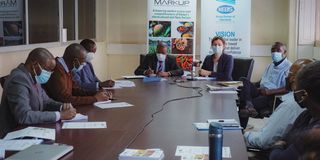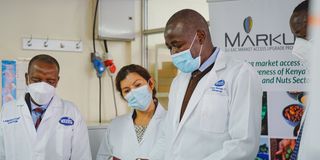Premium
EU donation to help Kebs ensure Kenya’s food safety

Stakeholders from EU, Kebs and Markup Kenya during the handing over of the CRMs at Kebs headquarters in Nairobi.
The Kenya Bureau of Standards (Kebs) has received certified reference materials (CRMs) in a bid to enhance quality control in analytical laboratory tests.
This comes at a time when the World Standards Day (WSD) is being marked globally today (Thursday).
WSD is celebrated on October 14 as a way to pay tribute to collaborative efforts by experts globally who participate in development of voluntary technical agreements which are published as international standards.
Last Tuesday, the European Union (EU) handed over CRMs to Kebs as a way of supporting the institution’s bid to ensure food safety for both local and international markets.
“These CRMs are part of a long-term support to Kebs. The European Union is the biggest market for Kenya’s horticultural produce,” said European Union Ambassador to Kenya Henriette Geiger in a press statement.
Improving quality and safety standards, she added, assures a continued access to the European markets as well as quality produce for local consumption.
Fostering trade
Speaking during the handing over ceremony, Kebs Managing Bernard Njiraini hailed the relationship between the institution and EU, saying the two had come a long way through projects that have left an indelible mark on the Kenyan economy and fostered trade between Kenya and the European Union.
“Our partnership has enabled us develop standards and codes of practice related to plant and animal-based products, upgrade our laboratories and update and maintain a risk-based residue and contaminant monitoring plan,” said Mr Njiraini.
He added that it was exciting for Kebs to be in partnership with EU through the Market Access Upgrade Program (Markup) Kenya that seeks to support increased exports of agribusiness and horticultural products, promote regional integration as well as access to European markets for Kenya as well as the whole of East Africa.
Ms Myra Bernadi, head of Agriculture, Job Creation and Resilience section of the European Union delegation to Kenya, acknowledged the fact that reference materials are particularly important for analytical chemistry and clinical analysis.
“We are indeed happy to have supported the provision of CRMs to laboratories in Kenya, particularly at Kebs and in future those at Kenya Plant Health Inspectorate Services (Kephis),” said Ms Bernadi.
The CRMs were provided through Markup Kenya, which is funded by the EU and implemented by the United Nations Industrial Development Organisation (Unido) in partnership with the government and private sector.

Kebs acting Chief Manager for Testing Services Tom Okumu shows some of the CRMs to EU head of Agriculture and Resilience Myra Bernadi and Kebs MD Benard Njiraini.
Highly characterised products
Acting chief manager for testing services at Kebs Tom Okumu described CRMs as highly characterised products with known qualities or properties. It is these properties, he added, that help in assuring the quality of results received from the laboratories.
The CRMS are used for quality control in analytical testing laboratories to demonstrate and give assurance on reliability and accuracy of test results released by laboratories in the various samples tested.
Among CRMs that Kebs received include elemental analysis tools which are used to test minerals like sodium, zinc, iron and others that the body requires on a daily basis.
Others are CRMs covering toxic metal contaminants use for testing metals such as mercury.
Kebs also received CRMS for micro-toxins, also known as aflatoxins, which are used to validate presence of toxic stuff, according to Mr Okumu.
“The availability of these reference materials has supported Kebs’ initiatives in development of reference materials and assignment of values to proficiency testing samples distributed locally and in the EAC hence strengthening Kebs testing laboratories as the national reference laboratory for conformity for locally imported and imported goods traded in Kenya and beyond,” said Okumu
Awareness on aflatoxin
Among key interventions that Markup Kenya hopes to achieve is creating awareness on aflatoxin contamination and prevention, especially for macadamia, groundnuts and dried herbs and spices.
Unido Kenya Country Representative Kawira Bucyana said Markup Kenya is committed to increasing awareness and adherence to food safety standards for particular value chains.
The CRMs provided to Kebs, she noted, are one of the many ways this project is working towards ensuring better quality assurance and more markets for Kenyan produce, adding that the benefits will trickle down to all stakeholders across the value chain.
Markup Kenya National Project Coordinator Maina Karuiru emphasised on the need for production of quality food, safe from contaminants such as chemicals, microbial and pesticides residues.
The programme, he added, is keen on training farmers on issues such as GAP and other standards and certifications as required so that Kenyan produce can get more markets locally, regionally and internationally with a bias to the EU.





